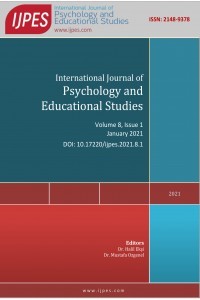Special Education Candidate Teachers’ Metaphors about Social Media
Because technology is developing each day and internet is getting easier to access, the types of communication among the people also have a constant alteration. Social media being one of the leads, especially the students undergoing an education frequently use these new communication styles. Studies in this context suggest that students do not use social media only to communicate with each other but also to exchange information, cooperate and share their class materials. In this regard, the perspectives of those who will be teaching students with special needs regarding social media are important to focus on. Therefore, this inquiry aims to identify the approaches of special education candidate teachers about social media courses through metaphors. The phenomenological research design was applied in this study. Participants were chosen from the candidate teachers who studied Special Education Teaching at Sakarya University Education Faculty in 2017 and 2018. The data was collected through the forms which had expressions as “because it is … social media is like … “and content analysis was used to examine this data. The forms were filled by 87 participants and the results show that they have developed 81 different metaphors. Based on the reasons for these metaphors researchers formed 6 categories: life colour, side effect, object, dependency, necessity and waste of time. It was also observed that the perspectives of special education candidate teachers about social media courses were typically positive.
Keywords:
Social media, metaphor special education, teacher candidate,
___
- Ajjan, H. & Hartshorne, R. (2008). Investigating faculty decisions to adopt web 2.0 technologies: Theory and empirical tests. The Internet and Higher Education, 11(2), 71−80. doi: 10.1016/j.iheduc.2008.05.002.
- Aktekin, S. (2010). Hayat boyu öğrenme ve sürekli mesleki gelişim. (Ed. M.Safran), Tarih Nasıl Öğretilir? Tarih Öğretmenleri İçin Özel Öğretim Yöntemleri (377-384), İstanbul: Yeni İnsan Yayınevi.
- Aküzüm, C. & Saraçoğlu, M. (2017). Üniversite öğrencilerinin sosyal medyaya ilişkin tutumlarının incelenmesi. Dicle Üniversitesi Ziya Gökalp Eğitim Fakültesi Dergisi, 32, 803-817. doi: 10.14582/DUZGEF.789.
- Alav, O. (2014). Sosyal medya’nın birey ve toplumsal yapıya etkileri. Elektronik Sosyal Bilgiler Eğitimi Dergisi, 1(1), 1-22.
- Aslan-Bağcı, Ö. & Bağcı, H. (2016). Çocuk gelişimi programı öğrencilerinin sosyal medya kullanım amaçları ve sosyal medya hakkındaki görüşleri. International Academic Research Congress. 3-5 November 2016. Antalya- Side. 1186-1191.
- Correa, T., Hinsley, A. W., & De Zuniga, H. G. (2010). Who interacts on the Web?: The intersection of users’ personality and social media use. Computers in human behavior, 26(2), 247-253. doi: 10.1016/j.chb.2009.09.003.
- Council for Exceptional Children (CEC, 2014). CEC Professional Standards. https://www.cec.sped.org/Standards.
- Gül, Ş. & Diken, E. H. (2018). Fen bilgisi öğretmeni adaylarının sosyal medya bağımlılıklarının incelenmesi. Kafkas Üniversitesi, e-Kafkas Eğitim Araştırmaları Dergisi, 5(1), 41-50. doi: 10.30900/kafkasegt.386531.
- Güven, B. & Güven S., (2009). İlköğretim öğrencilerinin sosyal bilgiler dersinde metafor oluşturma becerilerine ilişkin nicel bir araştırma. Kastamonu Eğitim Fakültesi Dergisi, 17(2), 503-512.
- Horzum, M. B. (2016). Examining the relationship to gender and personality on the purpose of Facebook usage of Turkish university students. Computers in Human Behavior, 64, 319-328. doi: 10.1016/j.chb.2016.06.010
- Jensen, F.N. (2006). Metaphors as a bridge to understanding educational and social contexts. International Journal of Qualitative Methods, 5(1), 1-17. doi: 10.1177/160940690600500104.
- Jones, N., Blackey, H., Fitzgibbon, K., & Chew, E. (2010). Get out of MySpace . Computers&Education, 54, 776- 782. doi: 10.1016/j.compedu.2009.07.008.
- Kaplan, A. M., & Haenlein, M. (2010). Users of the world, unite The challenges and opportunities of Social Media. Business horizons, 53(1), 59-68. doi: 10.1016/j.bushor.2009.09.003
- Karaboğa, M. T. (2018). Üniversite öğrencilerinin bir sosyalleşme alanı olarak sosyal medya hakkındaki görüşleri. Mersin Üniversitesi Eğitim Fakültesi Dergisi, 14(3), 912-936. doi: 10.17860/mersinefd.475515
- Karasu, M., & Arıkan, D. (2016). Öğretmen adaylarının sosyal medya kullanım durumları ve medya okuryazarlık düzeyleri arasındaki ilişkinin incelenmesi. Ege Eğitim Dergisi, 17(2), 549-566. doi: 10.12984/egeefd.280757.
- Kovecses, Z. (2002). Metaphor: A Practical Introduction, Oxford University Pres, New York.
- Küçükali, A. (2016). Üniversite öğrencilerinin sosyal medya Kullanımı: Atatürk üniversitesi örneği. Bartın Üniversitesi İ.İ.B.F Dergisi, 7(13), 531-546.
- Lakoff, G. & Mark, J. (2005). Metaforlar: Hayat, Anlam ve Dil. (Çev. Gökhan Yavuz Demir), İstanbul: Paradigma Yayınevi.
- Ludlow, B. L. (2001). Technology and teacher education in special education: Disaster or deliverance? Teacher Education and Special Education, 24(2), 143-163. doi: 10.1177/088840640102400209
- Mayfield, A. (2008). What Is Social Media?. http://www.icrossing.co.uk/fileadmin/uploads/ eBooks/What_is_Social_Media_iCrossing_e book.pdf.
- Palmquist, R. (1996). The Search for an Internet Metaphor: A Comparison of Literatures, American Society of Information Science Conference.
- Solmaz, B., Tekin, G., Herzem, Z. & Demir, M. (2013). İnternet ve sosyal medya kullanımı üzerine bir uygulama. Selçuk İletişim, 7(4), 23-32.
- Saban, A. (2008). Okula ilişkin metaforlar. Educational Administration: Theory and Practice, 55, 459-496.
- Saban, A. & Ersoy, A. (2017). Eğitimde Nitel Araştırma Desenleri. Ankara: Anı Yayıncılık
- Ulukök, Ş., Bayram, K. & Selvi, M. (2015). Fen bilgisi öğretmen adaylarının biyoloji kavramına ilişkin zihinsel imgeleri (Metafor analizi örneği). International Online Journal of Educational Sciences, 7(3), 244-259.
- Ulusoy, A. & Bostancı, M. (2014). Çocuklarda sosyal medya kullanımı ve ebeveyn rolü. The Journal of Academic Social Sciences Studies, 28, 559-572. doi: 10.9761/JASSS223.
- Vural, Z. B. A. & Bat, M. (2010). Yeni bir iletişim ortamı olarak sosyal medya: Ege üniversitesi iletişim fakültesine yönelik bir araştırma. Journal of Yasar University, 20(5), 3348-3382.
- Weinberg, T. (2009) The New Community Rules: Marketing On The Social Rules, O’Reilly Media, USA.
- Yıldırım, A. & Şimşek, H. (2005). Sosyal Bilimlerde Nitel Araştırma Yöntemleri (5. baskı), Ankara: Seçkin Yayıncılık.
- ISSN: 2148-9378
- Başlangıç: 2014
- Yayıncı: Mustafa ÖZGENEL
